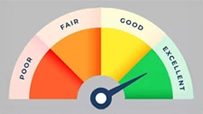7 Steps to Get Started Your Home Loan Application Process in India
Disclaimer: This blog contains generic information only. Ujjivan SFB is not responsible for the accuracy of the information provided herein. Please click 'Apply Now' to view our Home Loan products.
September 02, 2025

Buying a home is one of the biggest dreams for most of us. But with rising property prices, it's not always possible to pay the full amount upfront. That’s where a home loan in India becomes a helpful option. It allows you to spread the cost over several years while moving into your dream house today. In this guide, we’ll walk you through the entire home loan application process in India, step by step.
Whether you're applying for the first time or just looking for clarity, this blog will help you understand what’s needed, how to qualify, and how to get started on your home loan application.
So, if you’ve ever wondered how to apply for a home loan or what documents are required, you’re in the right place.
Step 1: Check Your Home Loan Eligibility
Before you apply, the first thing to do is check if you qualify for a home loan. Banks and financial institutions look at a few basic things:
- Your age (usually between 21 and 60)
- Your income and job stability
- Your existing EMIs or loans
- Your CIBIL score for a home loan, which shows how well you've repaid loans in the past
Concerned about home loan eligibility? You can use an online home loan eligibility calculator. It’s a simple tool that asks you to enter your income, expenses, and loan amount to determine your eligibility.
Remember, a good CIBIL score for home loan (usually 750 and above) increases your chances of getting approved with better interest rates. So, if your score is low, it’s worth improving it before applying.
Checking your home loan eligibility takes just a few minutes and saves you time and effort later in the process.
Step 2: Choose the Right Type of Home Loan
Not all home loans are the same. Before you proceed, make sure you pick the one that matches your needs.
At Ujjivan SFB, for example, you can apply for:
- A home loan to buy a ready-to-move-in property
- A construction loan if you’re building your house on a plot
- A home improvement loan for renovations or repairs
- A home equity loan is if you want to use the value of your property to raise funds
Understanding the different types of home loans in India helps you avoid confusion later. For instance, if you want to buy a plot and construct later, go for a composite loan.
Also, look for options that offer competitive home loan interest rates in India based on your profile and property type. Some banks even provide flexible EMIs and top-up loans if you're already an existing borrower.
Step 3: Documents Required for a Home Loan Application
Once you know which loan you need, the next step is gathering your paperwork. Having your documents ready in advance makes the home loan application process much faster and stress-free.
Here are the common documents required for home loan applications:
- ID Proof – Aadhaar Card, PAN Card, Passport, etc.
- Address Proof – Electricity bill, rent agreement, Voter ID, etc.
- Income Proof
◦ Salaried: Salary slips (last 3 months), bank statements, Form 16
◦ Self-employed: ITRs, business proof, income statements - Property Documents – Sale agreement, allotment letter, property tax receipts, NOC from builder/society
- Photographs – Passport-size photos for all applicants
Each bank may have slight variations, but these are standard. Make sure all your documents are updated, signed where required, and neatly arranged. Missing paperwork can delay the process or lead to rejection.
If you’re looking to apply for Ujjivan SFB Home Loan and are unsure of the documents required, please reach out to us via our toll-free number 1800 208 2121. Our support team will help you understand the process better.
Step 4: Apply Online or Visit Your Nearest Branch
Now that you’ve selected the loan and organized your documents, it’s time to apply. Most banks, including Ujjivan SFB, allow you to apply in two ways:
- Online: Visit the official website, go to home loans, click on Apply Now, fill out the form and submit. Our representatives will contact you to assist further.
- Offline: Walk into your nearest Ujjivan Small Finance Bank branch and apply in person
Online application forms are user-friendly and usually ask for basic details like name, income, loan amount, and property type. Once submitted, a representative will reach out to guide you further.
Whether online or offline, how to apply for a home loan isn’t a complicated process anymore. Choose the method you’re most comfortable with, and make sure you follow up with the bank after applying.
Step 5: Wait for Loan Processing and Sanction
Once you apply, the bank begins its internal checks. This stage may take a few days depending on the Bank and the complexity of your profile. But don’t worry — here’s what happens behind the scenes:
- The bank verifies your documents
- It checks your CIBIL score for home loan again
- It sends someone to verify your employment and income (sometimes over a call)
- Then, it evaluates the property you're buying
If everything looks good, you’ll receive a home loan sanction letter. This letter mentions the approved amount, interest rate, EMI, and repayment tenure. It’s a sign that your loan is almost ready to go.
A strong CIBIL score for home loan helps you get sanctioned quickly and may even qualify you for a lower home loan interest rate.
The home loan sanction process is fairly straightforward, especially if all your documents are in order and your credit profile is stable.
Step 6: Signing the Agreement and Confirming the Terms
After your loan is sanctioned, you’ll be asked to sign the home loan agreement. This is a legal document that finalizes the terms between you and the bank.
Here’s what it usually includes:
- Loan amount and tenure
- EMI schedule and repayment method
- Applicable home loan interest rate (fixed or floating)
- Processing fee details
- Rules around prepayment, late fees, or foreclosure
Take your time to read through it. Ask questions if something feels unclear. Once signed, this agreement becomes binding.
Signing the agreement officially makes you a borrower. The next step is getting your money and moving into your home!
Step 7: Disbursal of Your Home Loan and Start of Repayment
Once everything is signed, your loan is ready for disbursal. This means the bank will now release the money.
Depending on your property type, the amount is:
- Paid in full if the house is ready-to-move
- Released in parts (tranches) if it’s under construction
Most banks transfer the loan amount directly to the seller or builder—not to you.
From here, your home loan EMI schedule begins. Every month, the EMI will be auto-debited from your account until the loan is paid off.
Want to know how much your monthly payment will be? Use a home loan EMI calculator—a simple online tool where you enter your loan amount, tenure, and interest rate. Ujjivan Small Finance Bank provides one on their website to help you plan better.
The home loan disbursal is the final step, but the journey really begins with responsible repayment.
Bonus Tips for First-Time Home Loan Applicants
Here are a few simple but useful tips to make your experience smoother:
- Check your CIBIL score and clear any unpaid dues before applying
- Prepare all documents required for home loan in advance to avoid delays
- Compare home loan interest rates in India before choosing a Bank
- If eligible, apply under PMAY subsidy to save on interest
- Go with banks like Ujjivan that offer flexible repayment and easy top-up options
- Always read the fine print in your home loan agreement
These tips apply whether you’re buying a first home, building one, or renovating your current one with a home improvement loan.
Final Thoughts
If you’ve been wondering how to apply for a home loan, or comparing banks to find the best bank for home loan, Ujjivan Small Finance Bank offers a supportive and transparent process for home loan application. This process is the same for first-time buyers, small business owners, and salaried individuals. Your dream home might be closer than you think.
Disclaimer:
The contents herein are only for informational purposes and generic in nature. The content does not amount to an offer, invitation or solicitation of any kind to buy or sell, and are not intended to create any legal rights or obligations. This information is subject to updation, completion, amendment and verification without notice. The contents herein are also subject to other product-specific terms and conditions, as well as any applicable third-party terms and conditions, for which Ujjivan Small Finance Bank assumes no responsibility or liability.
Nothing contained herein is intended to constitute financial, investment, legal, tax, or any other professional advice or opinion. Please obtain professional advice before making investment or any other decisions. Any investment decisions that may be made by the you shall be at your own sole discretion, independent analysis and evaluation of the risks involved. The use of any information set out in this document is entirely at the user’s own risk. Ujjivan Small Finance Bank Limited makes no representation or warranty, express or implied, as to the accuracy and completeness for any information herein. The Bank disclaims any and all liability for any loss or damage (direct, indirect, consequential, or otherwise) incurred by you due to use of or due to investment, product application decisions made by you on the basis of the contents herein. While the information is prepared in good faith from sources deemed reliable (including public sources), the Bank disclaims any liability with respect to accuracy of information or any error or omission or any loss or damage incurred by anyone in reliance on the contents herein, in any manner whatsoever.
To know more about Ujjivan Small Finance Bank Products Visit:"https://www.ujjivansfb.in"
All intellectual property rights, including copyrights, trademarks, and other proprietary rights, pertaining to the content and materials displayed herein, belong
to Ujjivan Small Finance Bank Limited or its licensors. Unauthorised use or misuse of any intellectual property, or other content displayed herein is strictly prohibited and the same is not intended for distribution to, or use by, any person in any jurisdiction where such distribution or use would (by reason of that person’s nationality, residence or otherwise) be contrary to law or registration or would subject Ujjivan Small Finance Bank Limited or its affiliates to any licensing or registration requirements.
FAQs
1. What is the minimum CIBIL score required for a home loan in India?
Most banks prefer a CIBIL score of 750 or above for home loans. A higher score improves your chances of approval and may help you secure better interest rates. That said, if your credit score is slightly lower, you can still get a home loan with Ujjivan. Contact us to understand the process.
2. How do I check if I’m eligible for a home loan?
You can use a home loan eligibility calculator online. Just enter your income, age, and basic details to know the loan amount you may qualify for instantly.
3. Can I apply for a home loan if I am self-employed?
Yes, both salaried and self-employed individuals are eligible to apply. You’ll need to submit income proof like ITRs, bank statements, and business documents as part of the application, if you’re self-employed.
4. What is the maximum tenure for a home loan?
Home loans in India typically offer a repayment tenure of up to 20 years.
5. What documents are required for a home loan application?
You’ll need ID proof, address proof, income proof, and property-related documents. Ensure all documents are up to date and match your application details to avoid delays. However, these are common documents. Please reach out to us to understand the list of documents required.
6. How is the EMI for a home loan calculated?
Home loan EMIs are calculated based on the loan amount, interest rate, and tenure. Use the EMI calculator on Ujjivan SFB’s website for quick estimates.
7. Can I apply for a home loan online?
Yes, you can apply online through Ujjivan SFB’s website or bank branch. The process is simple, fast, and supported by digital document submission.
8. What types of home loans does Ujjivan SFB offer?
Ujjivan SFB offers home purchase loans, construction loans, home improvement loans, composite loans, top up loans, and home equity loans to suit different needs and financial goals.
9. Can I prepay or foreclose my home loan early?
Yes, you can prepay or foreclose your home loan. Always check the terms in your agreement for any applicable charges, especially if you’ve a fixed interest rate home loan. Banks don’t charge any pre-closure fee for floating rate loans.
Latest Blogs

Good Debt vs Bad Debt: Learn the Difference
August 13, 2025
Every month, millions of Indians wait for the familiar debit alert, an EMI deducted from their account.

Got a Tax Refund? 5 Smart Ways to Put Your 2025 Refund to Work
August 13, 2025
For many taxpayers, there’s a unique sense of relief when a tax refund arrives.

Credit Score Not Improving? 5 Mistakes You Might Be Making
August 13, 2025
For most of us, a credit score feels like a silent judge sitting in the background of our financial lives.

Banking Jargon Decoded: 15 Key Terms You Should Know
May 13, 2025
Banking feels simple on the surface; deposit money, withdraw when needed, pay bills, or transfer funds.

The ₹10 Lakh Rule for Cash Deposit Explained
August 13, 2025
Every day, millions of Indians walk into their banks to deposit cash, sometimes a few thousand rupees, sometimes several lakhs.





